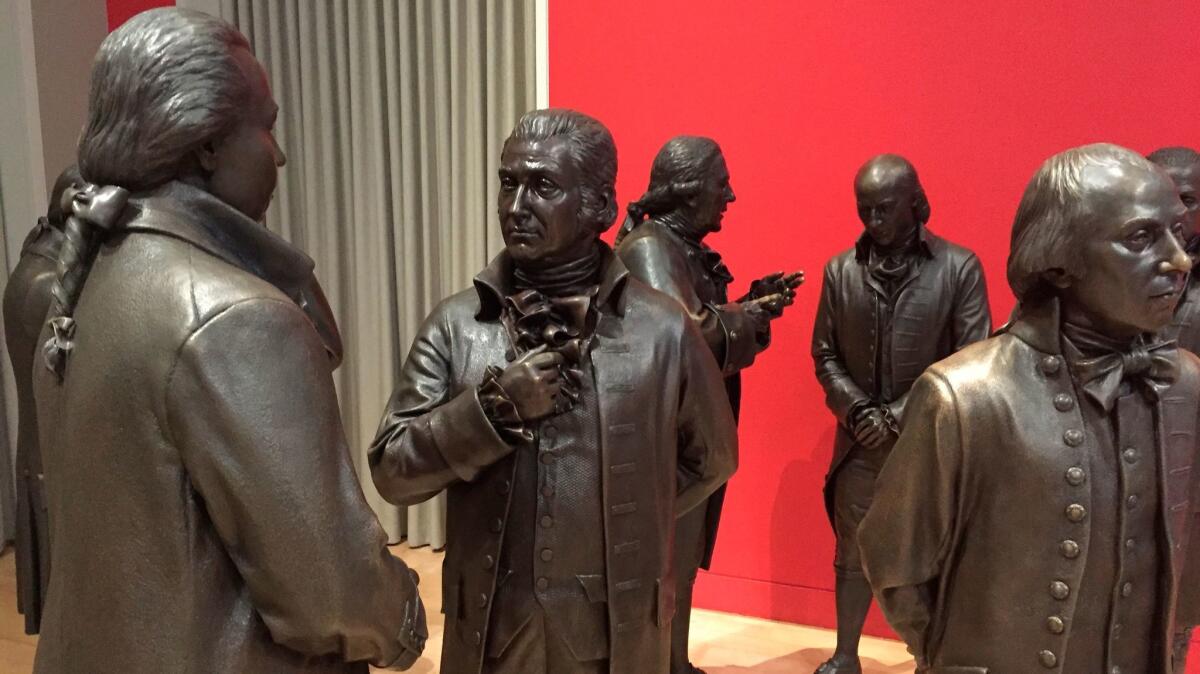Op-Ed: Post election, progressives are embracing conservative traditions

The volte-face began on election night. Donald Trump had already tucked both Ohio and Florida under his belt, and Pennsylvania was looking promising. As the pundits realized that it was Hillary Clinton, not Trump, who had a “difficult path” to an electoral majority, there was first disbelief; then, a sluggish acceptance; and, finally, a mass alighting upon a single word: “Resistance.”
For eight long years, the progressive left took square aim at James Madison and his constitution-drafting compatriots. Irritated by the Republican Party’s recalcitrant insistence upon the representation of its voters, the Democrats and their enablers came to forget their “Schoolhouse Rock” and to embrace their inner caudillos. At Wonkblog and at Vox — and at all the other ersatz-Wikipedia wannabes — expedient explainers abounded. We learned that America would be better off with a parliament, that federalism was outdated and that separation of powers was at the root of our national decay. The president, we were told, had “won,” and enjoyed a mandate to set the agenda — by hook, if possible, by crook, if not. “If Congress won’t act,” President Obama proved fond of saying, “I will.” And how happily his fans applauded.
Before Nov. 8, to complain about presidential overreach or the decline of federalism or the continuing diminishment of Congress was to be labeled an “obstructionist” or a “nihilist” or a member of the “Party of No.” Today, it is the soul of enlightenment. In the New York Times, Jeffrey Rosen is forecasting a “[rediscovery] of the virtues of Jeffersonian small government,” of the sort that progressives “favored before the New Deal and the great society.” In the New Yorker, Ryan Lizza is proposing that “Congress would be wise to regain its proper place as the first branch of government, at least when it comes to serving as a check on a powerful executive.” And, at news conference after news conference, Democratic politicians are vowing to use the powers that they have been accorded. The mayors hope to assert their cities’ interests against Washington. The lawmakers wish to block Trump’s unsalutary appointments or the GOP’s proposed legislative changes.
When the baton passes to one’s enemies, the follies of expedience come clearly into view.
To a man, the resisters are channeling deeply conservative ideas. In Colorado, marijuana activists are championing federalism as a bulwark against the overreach of the centralized state. In New York, Los Angeles and Chicago, anti-deportation activists are citing a Supreme Court case that was brought against Bill Clinton’s gun-control initiatives and authored by Justice Antonin Scalia. In Washington, D.C., Rep. Elijah Cummings (D-Md.) has taken a break from trying to prevent congressional oversight and become the city’s foremost champion of legislative superintendence. From sea to shining sea, Federalist 51, which outlined the concept of “checks and balances,” is in vogue again.
And so it damn well should be. The Constitution adumbrates neutral, universally applicable rules so that no man, faction or party can grow too strong. Steeped in history as they were, the founders understood that it should not matter whether the president is an angel or a brute, whether the House is filled with saints or with sinners, or whether the Senate is one of thieves or of paragons — in all cases, the same rules must superintend their conduct.
In a system as divided as America’s, it is tempting to indulge our side’s excesses on the grounds of good intentions. “If Obama is a good man,” the question holds, “must we worry so deeply about the niceties?” A good answer to this inquiry was uncovered by the Romans under Sulla. When the baton passes to one’s enemies, the follies of expedience come clearly into view.
But will the lesson stick? Already, we have seen a handful of Democratic senators expressing regret for blowing up the filibuster. Already, it is being observed that in a large, diverse country, one-size-fits-all policies rarely hit the mark. Perhaps one day soon, progressives will thank the Obama-era GOP for keeping alive the tradition of intransigence.
If the left is serious about opposing Trump — and indeed, about opposing the next Trump — it will learn more than a fleeting lesson from its recent electoral slump. It will conclude that to check and to fracture power is to limit one’s exposure to its abuse. And it will understand that there are no permanent victories; no unassailable coalitions. One cannot dissolve human nature and recast it into a more salubrious mold; one can only circumscribe its effects. That, in short, is why we have a Constitution. Progressives who wish to “resist” the president will find their ultimate salvation in the very document they have liked to dismiss as a relic.
Charles C.W. Cooke is editor of National Review Online.
Follow the Opinion section on Twitter @latimesopinion and Facebook
More to Read
A cure for the common opinion
Get thought-provoking perspectives with our weekly newsletter.
You may occasionally receive promotional content from the Los Angeles Times.





